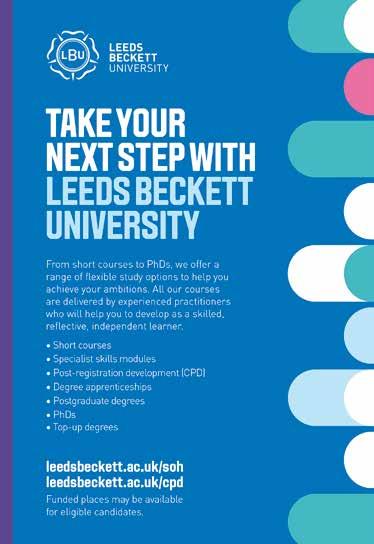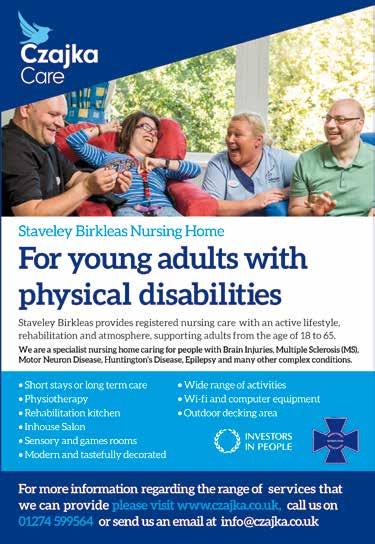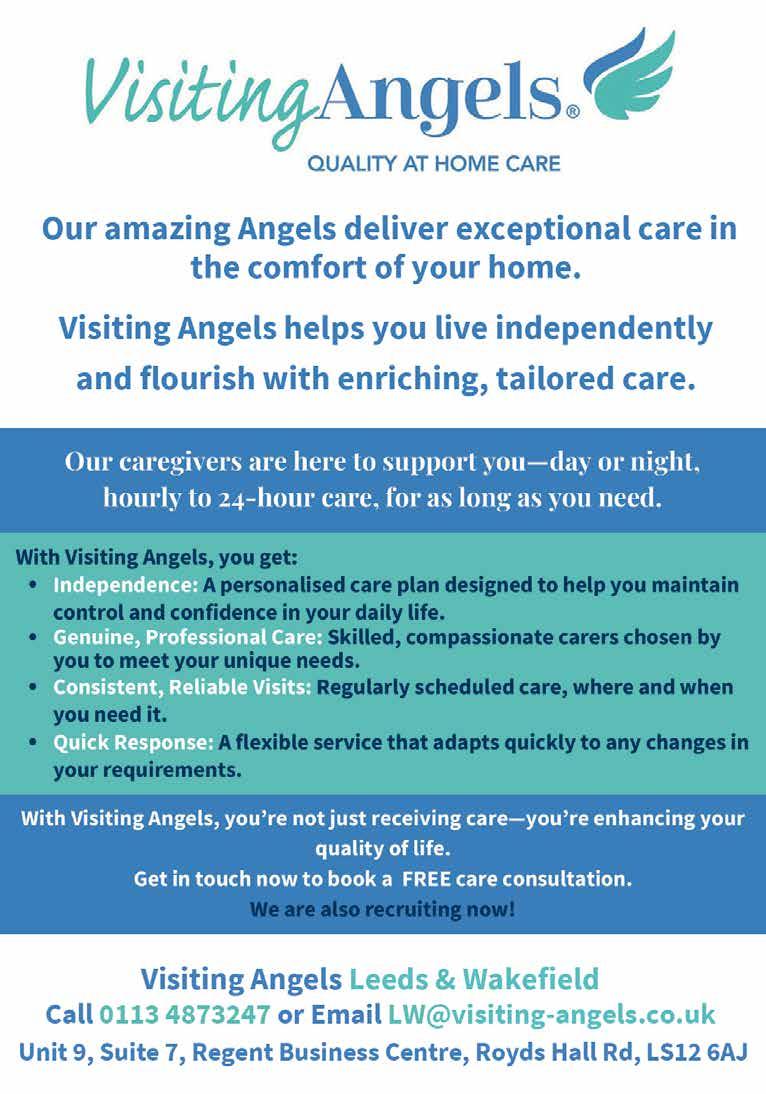

Planting for wellbeing
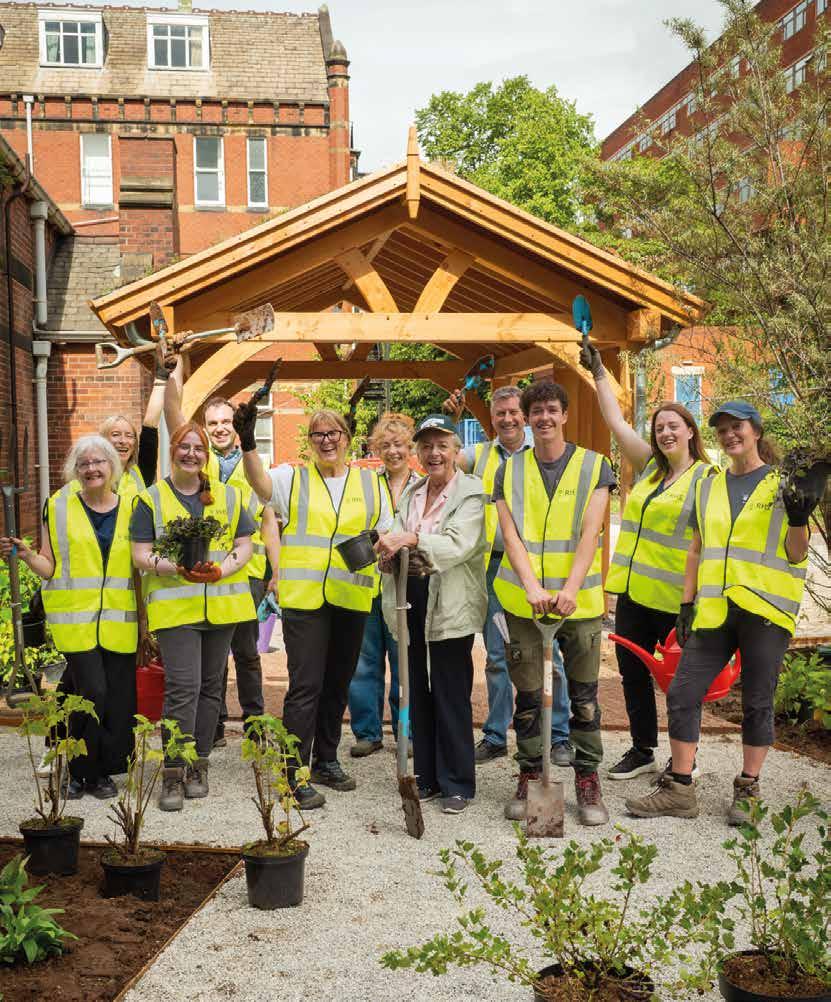
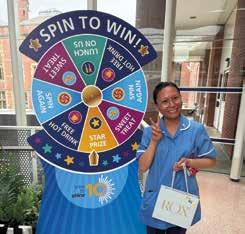
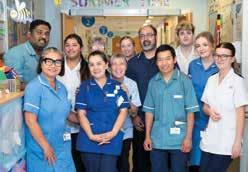
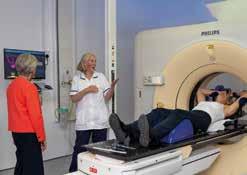
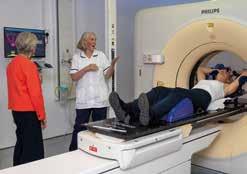
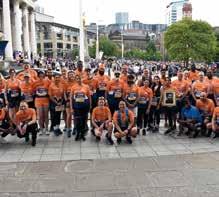
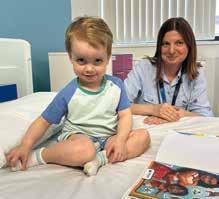
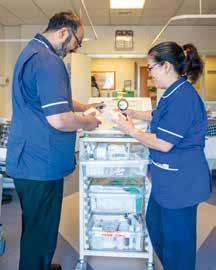
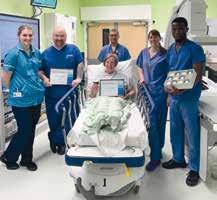
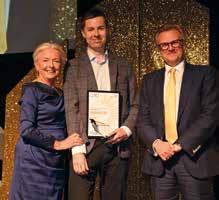
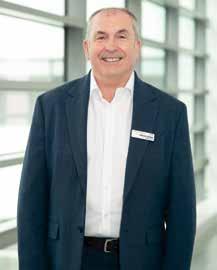



4-5 Running for MND
8 10-11
Natasha Foundation visits Leeds Children’s Hospital
Ten years of Time To Shine
Team Spotlight – Ward L23
60 seconds with Antony Kildare
20-21
27
New technology improves patient experience at Leeds Cancer Centre
Leeds Cancer Centre has introduced state-of-the-art Surface Guided Radiotherapy (SGRT) technology, eliminating the need for permanent tattoos in breast cancer radiotherapy. Thanks to an additional £600,000 of funding from Leeds Hospitals Charity, this advancement enhances both the precision and accessibility of treatment.
SGRT uses advanced surface imaging to guide radiotherapy, allowing patients to be positioned accurately without the need for permanent tattoos. This technology benefits approximately 1,800 breast cancer patients annually in Leeds, improving treatment safety and efficiency. It also reduces appointment times and increases capacity, enabling more patients to receive timely care.
A key feature of SGRT is its support for breath-hold techniques, which protect vital organs such as the heart during treatment. Traditionally, patients relied
on verbal instructions via intercom systems to manage breath control. SGRT introduces a visual aid, suspended above the patient that provides realtime feedback on breath-hold levels and positioning, ensuring optimal treatment delivery. This innovation is particularly transformative for patients with hearing impairments or communication challenges, who previously faced barriers to receiving certain radiotherapy techniques. The visual guidance system ensures inclusivity, allowing all patients to benefit from advanced care without compromising safety.
Peter Enever, Head of Radiotherapy at Leeds Cancer Centre, describes SGRT as a major step forward in patient-centred cancer care. By autumn 2025, the centre aims to offer tattoo-less radiotherapy to all breast cancer patients, setting a new benchmark in compassionate, highprecision treatment.
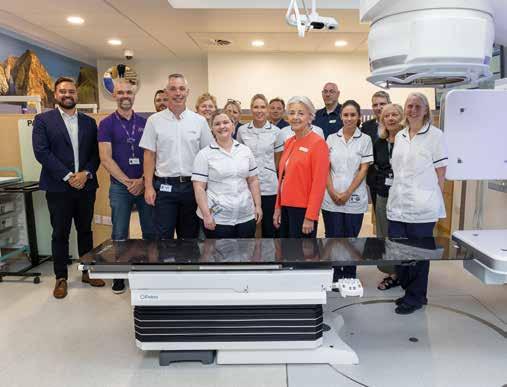
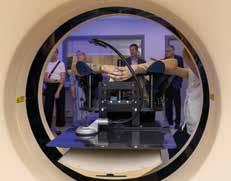
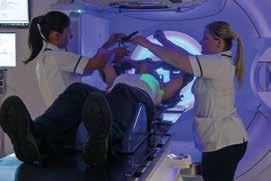
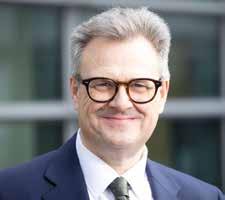
Welcome to the Autumn issue of Bulletin
It never ceases to amaze me the lengths to which our staff go in delivering patient-centred care, finding innovative solutions, and showing great feats of compassion. Our people helped create the Leeds Way values that shape our culture, and they continue to live these values every day.
This year, our venerable Time To Shine awards celebrated its 10th anniversary – ten years of recognising the outstanding achievements of colleagues across the organisation. Turn to p. 10 to read about the winners – each of who have been recognised for the hard work and dedication to deliver on our 7 Commitments and living our values. And turn to p. 9 to read about the fun and prizes leading up to the awards night – it meant everyone could take part!
To learn more about this year’s 7 Commitments, turn to p. 6 to read about some of the projects colleagues have been pushing forward to help deliver two of our commitments: creating greener patient pathways, and delivering compassionate patient care.
Values are intrinsic to the way people act, whether that’s in work or outside it. And you can see how colleagues have dedicated themselves to training and fundraising to support MND care in this year’s Leeds marathon and 10k on p. 4.
I hope you’ll finish reading this issue of Bulletin feeling as inspired as I did!
Kind regards

Prof. Phil Wood Chief Executive
Running for MND
Colleagues across the Trust lace up their running shoes to raise funds for Motor Neurone Disease charities
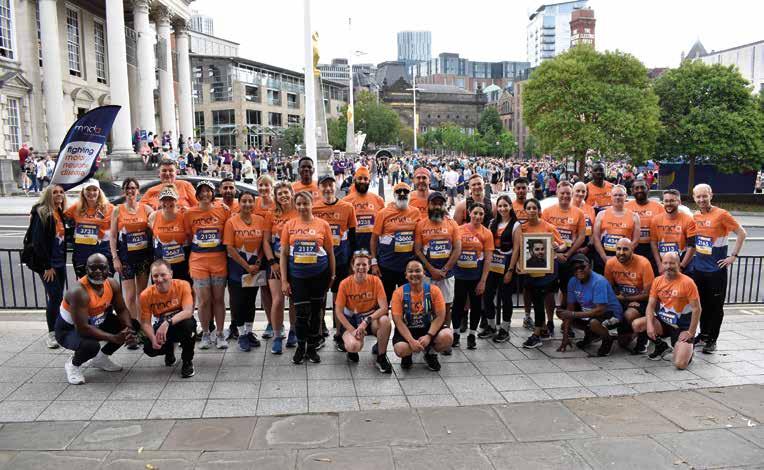
40 DIT colleagues run city’s 10k in memory of much-loved friend
40 colleagues from the Digital team and beyond ran the Leeds 10k in June in memory of Satpal Singh, a fellow colleague and friend lost to Motor Neurone Disease (MND) earlier this year. Satpal, a much-loved colleague, known by many for his selflessness, warmth and huge smile, had been diagnosed with MND last year and was forced to take early retirement from his role within the Digital team shortly afterwards.
Determined to help, friends and colleagues at the hospital raised more than £850 to support Satpal’s wife Rani and their family and also signed up to take part in the Leeds 10k with Satpal’s
blessing. In total, 40 runners were part of the team called Satpal’s Sprinters, helping to raise funds in his memory on behalf of the MND Association. The team raised an incredible £17,753.
Among the team was Steve Scott, who worked closely with Satpal. He said: “When we first discussed raising money for the Association in Satpal’s name, we didn’t anticipate just how big it would become – from the amazing number of colleagues and friends willing to participate, to the wonderful team spirit that has been so evident throughout – all leading to the gargantuan figure that we’ve raised for such a worthwhile and heartfelt cause.
“Everything about this effort epitomises Satpal – his selflessness, his warmth and friendliness, his smile – and we can also say we are following in his footsteps, given he completed the Jane Tomlinson 10k as a young man. We also take solace that he was aware of our endeavours and gave a big thumbs-up when he saw our team photos and messages. The camaraderie, encouragement and togetherness shown by Satpal’s Sprinters has been immense, and there have been quite a few laughs along the way, so we will have a fun day to ease any aches and pains and celebrate Saty and the Association’s work.”
Gary Firth – Rob Burrow Leeds Marathon
Gary Firth is a Ward Environment Porter in the Ophthalmology Outpatients department at St James’s Hospital, and ran the Rob Burrow Leeds Marathon in May. The marathon was the latest in a series of challenges Gary has undertaken after committing to improving his fitness following a period of ill health.
Gary said: “I came back from a holiday to Europe in November 2022 and was admitted to hospital as I was very unwell. I remained there for two weeks and was diagnosed as suffering from sepsis, pneumonia, and norovirus. In addition, I am a type 1 diabetic, and I have asthma. Throughout my time on the ward, the NHS staff were fantastic, and I thankfully made a full recovery.
“As a result of the care I received, I decided to improve my health and fitness and began an intensive training regime. I also realised that I wanted to work in the NHS myself and I started to apply for different roles which were advertised. I was successful in July 2023 and started working at St James’s Hospital as a porter. It has always
been my passion to help people and work alongside charities.
“I have witnessed first-hand the great care that the staff here provide to the patients, and I have continued my mission to become fitter and push myself to new limits and I have taken on several challenges over the past few years.”
Gary had been training regularly, going to the gym several times a week, completing boot camp style training sessions and following a diet with his personal trainer Jonathan Mulvey and everyone at bootcamp for over two years.
He said: “I chose to run for MND because of the Leeds Hospitals Charity appeal and I wanted to represent the hospital where I work. The brave journey that Rob Burrow and his family went through over the past few years is well known throughout Yorkshire, and particularly to the people of Leeds who had seen and supported Rob throughout his time at Leeds Rhinos. I feel that it is a great cause.”
Staff in Ophthalmology Outpatients are very proud of Gary for training, taking part and raising money and awareness of MND and the charitable appeal.


Jenny Cornish – Rob Burrow Leeds Marathon
Jenny Cornish is a Communications Manager in the Corporate Communications team and ran the Rob Burrow Leeds Marathon in May after hearing first-hand the work going on to build a new centre for MND care in Leeds.
Jenny said: “I ran the first Leeds marathon in 2023 and it was a fantastic experience with all the crowds and the atmosphere in the city, and Kevin Sinfield carrying Rob Burrow over the finish line. I started working for Leeds Teaching Hospitals last December and saw all the amazing work happening to fundraise for the new Rob Burrow Centre for MND, so when I was looking for a spring marathon this year it seemed like a great way to help.
“I have a 16-week training schedule I’ve used before, based around running
four times a week, but it was a little bit hit and miss this year due to work and commuting. I got up to 20 miles in training and did a couple of 18-mile runs as well. I also did a lot of walking from the train station to Jimmy’s!
“The marathon was a brilliant day – it was pretty hot but there were spectators all around the course spraying water on the runners, which really helped. I actually found it much better than 2023, I ran all the way, even up the Chevin, and finished 20 minutes faster, well under five hours which I was delighted with. The crowds were incredible again and really kept me going. I also enjoyed spotting the competitors in fancy dress – particularly the herd of cows.
“If you’re considering running the marathon next year, I’d say go for it, it’s an awesome experience – find a training plan that fits around your life and will get you over the finish line. And try to enjoy it!”
7 Commitments in Focus
Our 7 Commitments are about focusing our collective efforts across the Trust to make progress in what matters most.
We know there are big challenges facing all of our services with many competing priorities – our annual 7 Commitments gives us clarity over which are the most important priorities for the year.
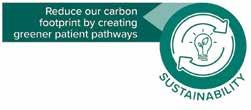
Recycling clinical equipment to make patient pathways greener
The Cardiology Interventional Electrophysiology (EP) team at the Trust has saved £124,000 on equipment and 940kg of CO2 in 2024 by recycling catheters used in their procedures.
This sustainability initiative was established by the EP team to help support greener care pathways in the Trust and ensures our patients’ journeys through the service is more sustainable. The scheme recycles and remanufactures catheters used in the EP team’s procedures, to reduce the amount of equipment the team disposes of and purchases.
During 2025-26, we’re dedicating each month from June through to January to exploring more about these 7 Commitments, why they matter, and how colleagues are making a difference. Here are a few of the stories in the spotlight. Search: 7 Commitments on the Intranet for more.
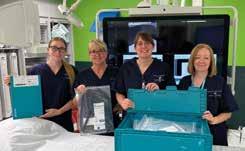
The scheme has saved 295kg of catheters from going into unrecyclable clinical waste streams in 2024 and has significantly improved the overall carbon footprint of the service.
Clinical Director of Cardio-Respiratory, Dr Andrew Hogarth, said: “Our teams in Cardio-Respiratory have worked tirelessly on this project to bring more sustainability to our services. They’re passionate about supporting our patients, creating a greener environment and safeguarding the future of our Trust. Seeing the impact they have on cost, carbon savings and the sustainability of our patient pathways is fantastic.”
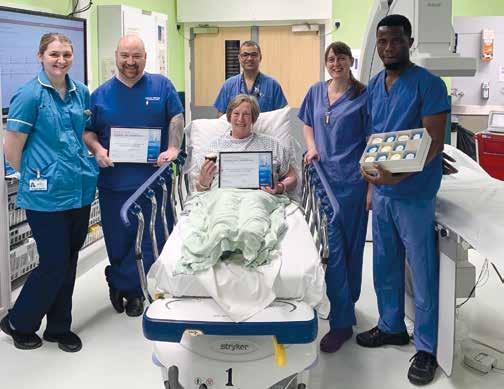

Reducing the carbon on our estate
We need a huge estate to be able to care for our patients and, with that, comes a substantial carbon footprint in order to heat it, keep the lights on and keep our services running. So, the Sustainability team is always looking for ways to reduce that carbon footprint.
This year, the team has been successful in securing a £6.588m grant from the government’s Public Sector Decarbonisation Scheme, which will add Bexley Wing and the Education Development and Training Centre, at St James’s, to the low-carbon heat network which has a connection to Leeds PIPES.
LTHT has already connected 17 buildings to the low-carbon heat network, which has been funded and developed throughout previous phases of the Public Sector Decarbonisation Scheme.
The proportion of heat that is utilised from the Leeds PIPES network is a by-product of burning Leeds’ non-recyclable waste, which means it not only stops our waste from going to landfill, but replaces reliance on fossil fuels to heat our buildings, providing a greener alternative for the Trust.
Chris Kelly, Associate Director of Estates Compliance and Risk, said: “This is fantastic news for the Trust. Thanks to this Public Sector Decarbonisation Scheme grant, we can decarbonise one of the largest and most carbon-intensive buildings in our Trust, and continue to make significant progress on our route to Net Zero.”
Our estate impacts the pathway of every patient who comes through our doors, so schemes like this continue to make their time with us just a little bit greener.

Making patients ‘part
of the multidisciplinary team’ in the Cystic Fibrosis Unit
Cystic Fibrosis is the biggest genetic condition in the UK and the Leeds Centre for Cystic Fibrosis is the third biggest unit of its kind in the country, providing care for more than 400 patients. This patient cohort has a tightly-knit community, and when the need for more frequent communications with patients became apparent, a regular meeting was set up over Teams.
The Patient Focus Group provides a direct communications channel between the unit and their patients. With an agenda jointly set by patients and the team, it means the unit can provide key updates whilst patients can discuss the issues that matter most to them.
Ward Manager Jason Swarbrooke said: “The Patient Focus Group is by far my favourite meeting that I go to. Patients with long term conditions are heavily invested in wanting to make our service succeed and we are always looking at ways to improve and develop.”
The focus group led to a newsletter and a social media channel being set up to further improve communications. The ward has been able to update the community on things like changes to staff, procedures, and other updates to the service. Patients have been empowered to give honest feedback and help make decisions on how charitable funding is spent – such as purchasing comfy chairs and mood lighting – ensuring the patient voice is at the heart of improvements.
“Our patient group is an energetic group where we have great discussions and debates and generate ideas. They bring such a unique perspective about Cystic Fibrosis services but it is also a safe space for patients to share their stories and chat with other patients about their experiences,” Jason added.
“The forum has given our patients a true voice and empowers them to work with us to provide a truly patient-focused approach.”
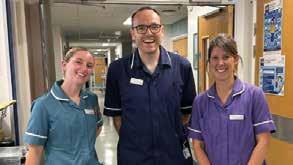
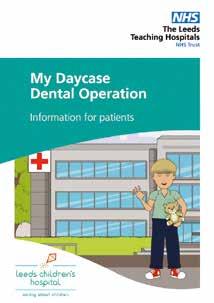
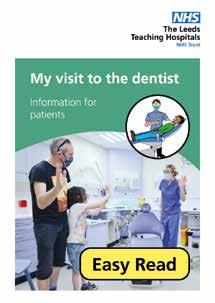
Supporting every smile at Leeds Dental Institute
At Leeds Dental Institute, an increase in the number of children and young people with confirmed or suspected autism or a learning disability has led to some unique challenges in providing timely and efficient patient-centred care. Bright lights, unfamiliar sounds, strong smells, and unpredictability can lead to sensory overload, resulting in distress, heightened anxiety, and, in some cases, challenging behaviours.
At LDI a working group of champions from different departments was set up to promote and facilitate the aims and values as set out by the Trust’s Learning Disabilities and Autism team. This has meant best practice and learning can be shared across the CSU.
For the paediatric team, a number of successes have come about from this work. Sensory items and distraction aids have been acquired from the charity Starlight for attending patients. Posters illustrating different dental procedures and easy-read patient information leaflets have helped prepare patients for their treatment and make information more accessible. And thanks to funding from Leeds Hospitals Charity, a reasonable adjustments project has been seeking to develop a pathway to identify all patients with a confirmed or suspected learning disability or autism
ahead of their first visit, with a reasonable adjustments call offered to families.
Zoe Shrivastva, Paediatric Specialty Dentist, said: “The Reasonable Adjustments Pathway provides personalised support for children and young people, along with their carers, to help ensure that their visit or general anaesthetic admission is as smooth and stress-free as possible for everyone involved. We have received highly positive feedback from families, who feel genuinely heard and supported throughout the process.”
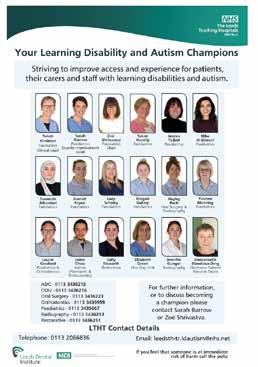
Natasha Allergy Research Foundation visits Leeds Children’s Hospital
In July, Leeds Children’s Hospital welcomed visitors from The Natasha Allergy Research Foundation (NARF). Visitors from Natasha’s Foundation and their partner organisations came to see first-hand how the Natasha Clinical Trial is helping young allergy patients in Leeds.
Children as young as two are taking part in the £2.7m Natasha Clinical Trial across nine NHS hospitals including Leeds Children’s Hospital. The trial aims to demonstrate the effectiveness of commonly available foods to treat peanut or cow’s milk allergies.
The Natasha Clinical Trial, which began in 2023, is a randomised controlled trial – the gold standard in medical research. Before starting the treatment, children and young people undergo food challenges over two hospital visits to confirm their food allergy diagnosis and make sure they are suitable to have the Oral Immunotherapy Treatment (OIT).
Once enrolled, each patient is given a very small amount of a food to which they are allergic at a dose that is safe for them, which is taken according to a standardised protocol under medical supervision. This may be given either in a hospital clinic or at home with medical support. If they tolerate the food, they then take a daily ‘dose’ of this real food at home, and the amount is gradually increased by the medical team every few weeks while being closely monitored for any adverse effects.
It is hoped that the OIT treatment will mean that patients who had previously suffered anaphylaxis on exposure to products such as peanuts, will now be able to tolerate eating a small amount of the allergen without having a dangerous
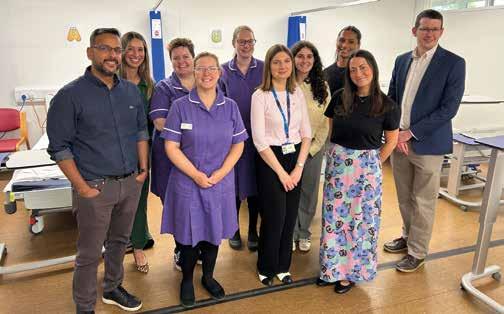
reaction. The results and clinical experience gained from the trial will help shape future treatment options for food allergies in the NHS. Results from the trial are expected in 2027.
Visitors from Natasha’s Foundation were given a tour of Leeds Children’s Hospital facilities including the Children’s Allergy Day Unit where patients come for allergy treatments, and the NIHR Leeds Clinical Research Facility (CRF) Children’s Site where patients come to take part in the study.
The Leeds Children’s Hospital trial is being led by Dr Aida Semic-Jusufagic, who said: “We were delighted to welcome visitors from The Natasha Allergy Research Foundation and their supporters and show them first-hand how their funding is already benefiting our patients here in Leeds. By taking part in this trial, we’re helping to shape
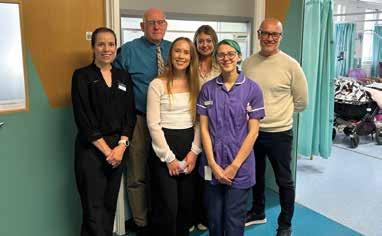
the future of the treatment of allergy in the NHS.”
The Natasha Clinical Trial is the first major study to be funded by The Natasha Allergy Research Foundation, set up by the parents of Natasha Ednan-Laperouse, who died aged 15 from a severe food allergic reaction.
Visitors spoke to families of patients taking part in The Natasha Clinical Trial in the CRF including parents of two-year-old Iyla who has several food allergies including dairy, egg, nuts, beans and peas. Parents Rachel and Mitesh spoke about how the Iyla’s dietary restrictions affect so many things in her life from childcare and holidays to day-to-day decisions about where to eat and who to spend time with. Iyla’s parents are delighted she has been given the opportunity to take part in the Natasha Trial.
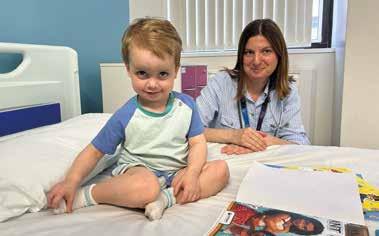
Take Heart Roof Garden reopens at LGI
Thanks to many generous donors raising £300,000, the extensively refurbished Take Heart Roof Garden at the Leeds General Infirmary is now welcoming visitors again.
This redesigned space now offers a calm and uplifting escape for patients, visitors and staff. The garden includes dozens of plants, ramps, sustainable and non-slip decking to help everyone move around and new benches and tables. It affords spectacular views of Leeds city centre.
A memorial called ‘The Butterfly Wall – A Living Tribute’ has also been installed in the garden, a vibrant and heartfelt space in honour of those who have touched lives but who are no longer with us. This includes cardiac patients and people such as Colin Pullan, the original char of the Take Heart Charity, and Dr Robert Sapsford, Consultant Cardiologist, who sadly died in a road traffic collision while riding his bike in September 2024. The garden can be found on F Floor, Jubilee Wing. It is open to all seven days
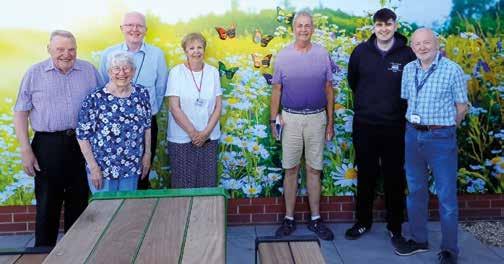
a week, 8am - 6pm, however for safety it will briefly close whenever a helicopter is coming into land. The refurbishment of the garden was completed by West Yorkshire construction company I&G.
Gina McGawley General Manager for the Cardio-Respiratory service at Leeds Teaching Hospitals and Chair
of Trustees with Take Heart, said: “It’s such an amazing, unique space right in the centre of the city. The feedback we’re getting for the garden is lovely; patients, staff and visitors find it a really accessible and relaxing space, where they can spend time together or use it for periods of reflection.”
Prizes and surprises: sharing the Time To Shine spirit
In the spirit of making the 10th anniversary of Time To Shine the biggest and best event ever, this year we got the party started early with the Spin to Win Tour.
Our special Spin to Win wheel headed out to five of our hospital sites in the 10-day countdown to Time To Shine, ready to treat colleagues to something special. It was an astounding success! High spirited queues of staff formed eager to try their hand at winning one of the hundreds of prizes on offer. The star prizes included an overnight escape at Rudding Park, Bowers & Wilkins headphones, shopping vouchers, restaurant experiences and much more. Overall, more than 1,300 staff walked away with a prize.
Alongside this our Executive team got out and about surprising 10 nominees for the Unsung Hero award who were drawn at random to receive a sweet treat in recognition of their achievements.
Thank you to Leeds Hospitals Charity for supporting these events and the local businesses who contributed to the prizes.
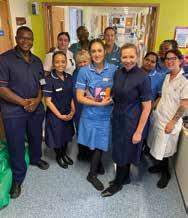
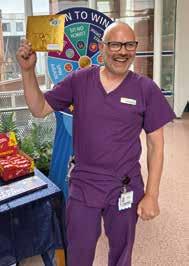
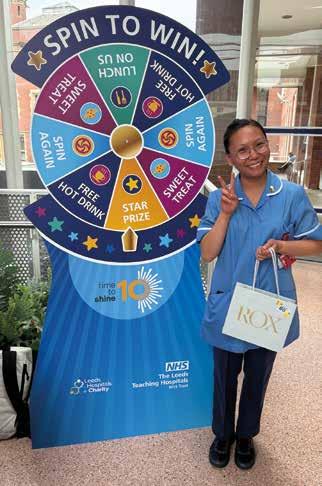
Staff in the spotlight Celebrating 10 years of Time To Shine
On Friday 4 July, we welcomed over 500 VIP guests to New Dock Hall in Leeds city centre to celebrate the outstanding achievements of colleagues across the Trust at the 10th anniversary of the Time To Shine Awards.
Over the last decade, Time To Shine has become more than just an awards ceremony – it has grown into a highly anticipated
tradition. It is an opportunity to step away from the demands of our daily work, come together, connect and celebrate the incredible contributions of our staff.
This year’s event was truly inspiring. The award categories were based on our 7 Commitments, and we received hundreds of nominations demonstrating our staff’s dedication to achieving excellence in each
of these areas. This year’s winners are just the tip of the iceberg when it comes to the extraordinary work taking place in all corners of the Trust.
Thank you to Leeds Hospitals Charity and Sovereign Healthcare for their support for Time To Shine, and congratulations to all our winners, highly commended entries and nominees.
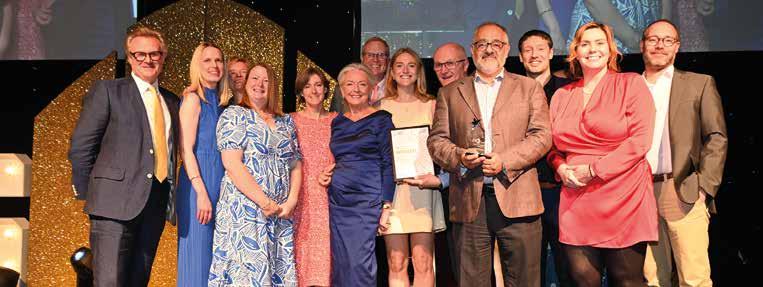
Resources – Winner
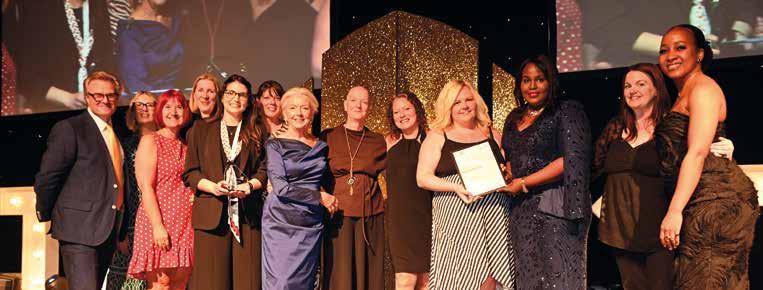
Sustainability – Winner
Continence Promotion, Tissue Viability and Procurement teams
Evaluating
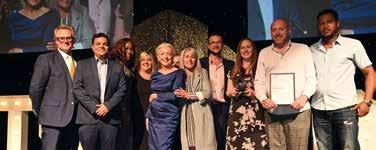
Care – Winner
Ward J15 Meal Service
Creating a new process to prepare patients for meal service leading to a 55-minute reduction in waiting time and a 76% reduction in healthcare-associated infections on J15.

Rising Star – Winner
Paul Grant, Business Analyst
Paul is tenacious, diligent, enthusiastic and always finds a solution to a problem. An asset to the team, a real leader and respected for his compassion and care for others.
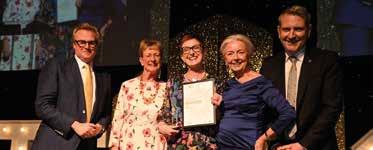
Hospital Hero (nominated by the public) – Winner
Tracy Jackson, Consultant Gynaecologist
Tracy has dedicated her career to the care of women and thinks outside the box to deliver care in a way that puts the patient’s comfort first.

Research & Innovation – Winner
Leeds Dental Institute Planning team
Using 3D planning to allow digital planning of complex surgical cases across multiple clinical service units, reducing patient operating times, freeing theatre capacity, reducing patient morbidity and providing financial savings.
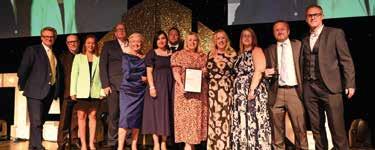
Team – Winner
Facilities Management Foundation Programme
Offering a bespoke development programme providing supervisors with ring-fenced time to learn and gain new skills to enhance their careers and support their busy frontline roles.

Unsung Hero – Winner
Katherine Omand-Barker, Senior Sister
Katherine provided vital practical and emotional support to a pair of international nurse colleagues whose child was born with a profound disability.
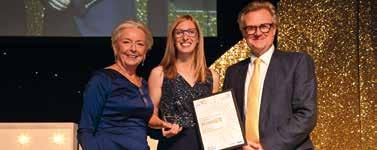
Finance – Winner
Jade Belton
Sourcing a new cost-effective accommodation provider for Selective Dorsal Rhizotomy patients, saving the Trust more than £1,700 per patient whilst ensuring comfortable accommodation with the required disabled facilities.
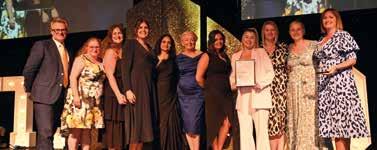
Timeliness - Winner
Neonatal sepsis: From Bench, to bedside and beyond
Implementing a satellite incubator to achieve faster blood culture results and reducing time to appropriate antibiotic treatment. Reducing unnecessary antibiotic exposure and enabling faster discharge for otherwise clinically well babies.
Blooming lovely progress on the new RHS Wellbeing Garden
Work began on the new RHS Wellbeing Garden at St James’s Hospital back in May and since then a stunning transformation has been underway. Located outside Trust HQ the garden will become a restorative space open to all staff to rest, reflect and relax.
Excitement for the garden ramped up towards the end of July when thousands of plants were delivered and volunteers from across the Trust donned gloves and trowels to join the RHS team to help with the planting. Former Trust Chair Dame Linda Pollard and Director of Estates and Facilities Craige Richardson, also joined the crew, selecting a large hydrangea to place in its new home.
Gardens are known to play a vital role in wellbeing and so the space has been created with staff in mind. There will be a range of new seating areas, an allweather shelter complete with green roof, and plenty of pollinator-friendly planting. The planting also includes new trees and shrubs, a mix of native and non-native wildlife-friendly planting and also a selection of medicinal plants such as valerian, evening primrose and lemon verbena in a nod to the garden’s setting on the hospital site.
Supporters for the project include Leeds Hospitals Charity who have contributed a grant of £50,000. The garden has an official opening event planned for the autumn.
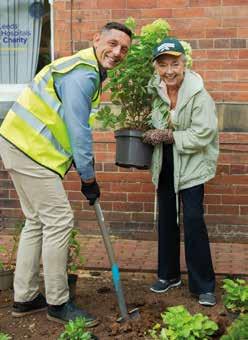
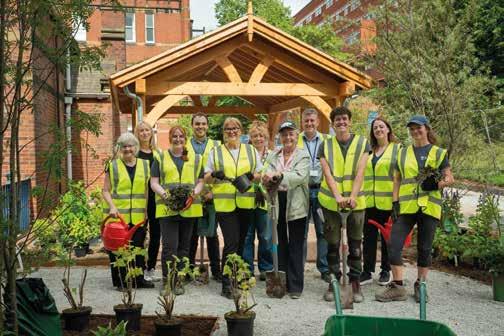
Alongside this project, the RHS have also supported the Trust with developing another of our green spaces at St James’s, outside the Chapel. The Chapel Garden received a makeover with several new beds and over 150 new trees, shrubs and plants. These include 38 ‘Catherine’s Rose’ bushes, a new variety named for the Princess of Wales. The new and improved Chapel Garden opened to staff, patients and visitors in July.
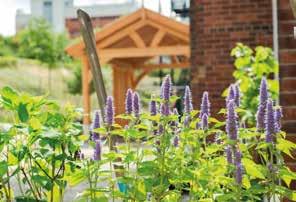
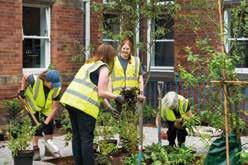

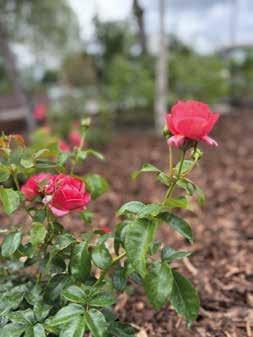
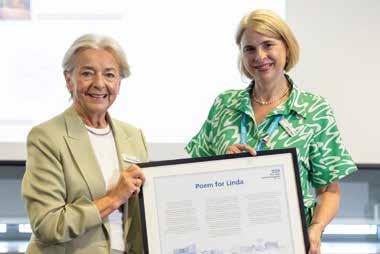
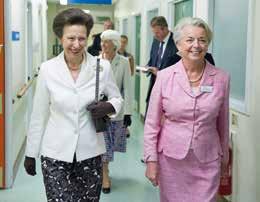
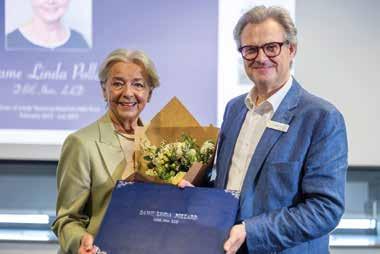
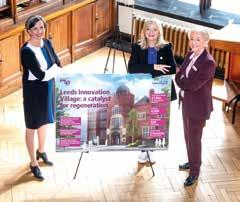
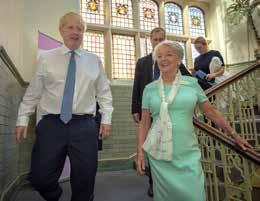
Farewell to Dame Linda Pollard
On 31 July, Leeds Teaching Hospitals marked the end of an extraordinary chapter as Dame Linda Pollard chaired her final Board meeting after more than 12 years of dedicated service as Chair of the Trust.
To honour her remarkable contribution, colleagues gathered for a heartfelt leaving presentation, led by Chief Executive Phil Wood, to celebrate Dame Linda’s achievements during this time and share our thanks for her leadership, vision, and unwavering commitment. Since stepping into the role in 2013, Dame Linda has been a strong advocate of providing the best possible patient care and equally recognising the tremendous work done by staff across the organisation. She has led with clarity, compassion, and courage as she steered the Trust through the challenges

of the pandemic and championed the development of new hospital facilities and the Innovation Village. Her ability to bring people together, from frontline staff to national leaders, has helped shape a collaborative culture across the organisation that ensures we work in partnership to deliver the best for our patients.
During the leaving presentation, NonExecutive Director, Gillian Taylor shared a poem dedicated to Linda and Chief Executive Phil Wood shared a tribute to Linda’s many qualities. This was wrapped up with a short video of Linda’s ‘best bits’ from over the years!
In recognition of Linda’s contribution to the Trust and her passion for innovation, Leeds Hospitals Charity has set up the Dame Linda Pollard Innovation Fund which, to date, has more than £50,000 in pledges made, which is fantastic news and will make a huge difference to progressing the innovative work of our teams across the Trust.
The Board meeting also saw Chris Schofield and Jane Nixon step down from their roles as Non-Executive Directors, having concluded their terms.
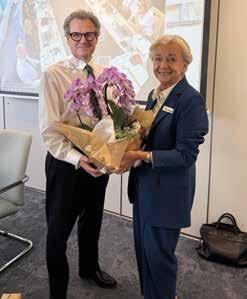
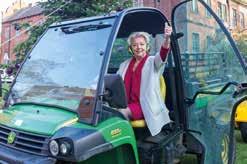
Future healthcare
The Trust is committed to world-class healthcare with research and innovation (R&I) at the heart of our approach. From the latest ground-breaking research, to delivering the newest medical advancements, the Trust has strong collaborations with healthcare, academic and industry partners to help improve the health and wealth across the region.
Here are recent highlights of inspiring accomplishments driving the future of healthcare.
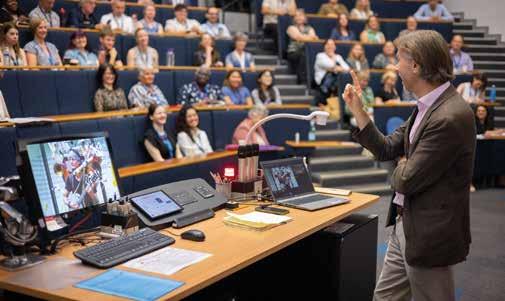
Leeds’ research and innovation shaping future healthcare
The annual Research and Innovation Conference took place in July, bringing together experts from across healthcare, academia, and industry, showcasing the latest insights and ground-breaking medical research innovations at LTHT.
The conference’s theme was Shaping Future Healthcare and was the largest and most ambitious conference yet with more than 70 speakers, workshops and demonstrations, attracting around 400 delegates. The research explored artificial intelligence (AI), advanced therapies, digital pathology innovation, experimental medicine trials and realworld data studies.
The event was held against the backdrop of new five-year figures, highlighting the breadth of the Trust’s R&I impact. R&I activities generated £140m, recruited over 117,000 participants into 1,460 active clinical studies, and supported 487 projects with healthcare companies across this period.
This conference has been followed by the unveiling of the Trust’s new Research and Innovation strategy which outlines an exciting vision for future plans. As an internationally-recognised

leading NHS Trust in clinical research, this will further enable the Trust to bring the latest medical advancements to patients’ bedsides.
The Trust has already established a reputation as a centre for excellence, delivering ground-breaking research and providing the treatments for the future. This new strategy builds on the success and is a renewed commitment to ensure every staff and patient has the opportunity to participate and benefit from research and innovation.
The five-year plan has been developed in collaboration with partners and colleagues and was approved by the Board on 31 July. It sets ambitious targets of £140m in research activity by 2030, a 40 per cent increase on its previous ambitions and directly supports the Government’s 10-year plan for the NHS (see p. 17).
Breakthrough FLAIR trial offers new hope for leukaemia patients
LTHT has co-ordinated a major UK clinical trial, revealing a new chemotherapy-free treatment for chronic lymphocytic leukaemia (CLL), significantly improving outcomes for patients over traditional approaches.
The FLAIR trial, sponsored by our partner the University of Leeds, involved 786 patients across 96 NHS centres using personalised blood tests. The results, published in the prestigious New England Journal of Medicine, showed two combined medications led to better outcomes than standard chemotherapy or a single drug.
After five years, 93.9% of participants receiving the combined therapy were alive without disease progression, compared to 58.1% of those on chemotherapy and 79.0% on one of the drugs alone. Two years into treatment, 66.2% had no detectable cancer in their bone marrow, compared to none on monotherapy and 48.3% on chemotherapy.
The trial is being hailed as a milestone in CLL treatment and part of a shift towards personalised medicine, using blood tests to tailor treatment and limiting the side effects of chemotherapy.
63-year-old Catherine Whitfield (pictured) from Farnley, West Yorkshire, credits the trial with giving her life back. Diagnosed in 2018, she is cancer-free and enjoying time with her grandchildren.
Funded by Cancer Research UK, AbbVie, and Johnson & Johnson, FLAIR is a successful collaboration between the NHS, academia, and the pharmaceutical sector. With around 3,800 people diagnosed with CLL in the UK each year, FLAIR offers a promising new standard of care.
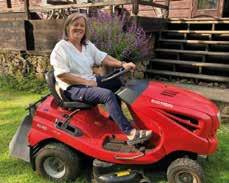
New AI Chest X-ray software to speed up diagnosis and improve patient care
LTHT is set to deliver faster and more accurate diagnoses in chest X-rays, thanks to new AI software undergoing evaluation at the Trust. LTHT has partnered with Annalise.ai and vendorneutral platform Newton’s Tree to bring this cutting-edge tool to our hospitals.
The newly implemented software will act as a ‘second pair of eyes’ for clinicians at LTHT, which performs 135,000 chest X-rays annually.
The software could identify up to 85 different findings, including results suggestive of lung cancer, acute infections, and incorrectly placed feeding and breathing tubes, delivering results in minutes. The initiative could also improve patient safety, helping detect critical conditions such as chest sepsis and reducing the risk of complications, such as ‘never events’ involving misplaced medical tubes.
This is part of a regional project backed by the NHS AI Diagnostic Fund, delivered through the Yorkshire Imaging Collaborative (YIC).
Market engagement and masterplan announced for Innovation Village
Earlier this year, with partners across the city, LTHT reaffirmed its commitment to the Innovation Village, a key neighbourhood within the Leeds Innovation Arc, which will become a goto destination for healthtech, research and innovation.
While the Government’s announcement of the New Hospital Programme delayed development of the new hospital at LGI, the Innovation Village will go ahead and the first phase is already underway at LGI. This involves transforming the Old Medical School into a cutting-edge healthtech hub in partnership with Scarborough Group International, one of the UK’s most active, privately-owned regeneration specialists.
We have also announced plans to drive forward the Innovation Village in Leeds city centre. The Trust partnered with Leeds City Council and West Yorkshire Combined Authority in May to announce the plan at the UK’s Real Estate Investment and Infrastructure Forum (UKREiFF) which marked a significant new stage in the development of the project.

Collaborating with Annalise.ai and Newton’s Tree ensures patients will benefit from some of the most advanced diagnostic tools available in the NHS today.
Dr Fahmid Chowdhury, Consultant Radiologist and Clinical Lead for the project at Leeds Teaching Hospitals said: “This technology is about putting patients first. By helping busy frontline
staff detect serious conditions quickly and accurately, Annalise’s Enterprise CXR solution will support clinical decisionmaking and allow us to get patients the treatment they need faster. Such large-scale evaluations of the use of AI in everyday clinical practice should provide crucial information to inform our future use of AI to improve the quality of care we provide to our patients”.

It was announced that a market engagement exercise would be undertaken which engages and collaborates with potential investors, developers, and occupiers on opportunities within the 12.5-hectare development site. This work has already commenced with the findings expected towards the end of the year. This will support a masterplan to consider future development opportunities with the
work being supported by city partners.
The Innovation Village will harness innovation and bring clinicians, academics and private sector partners together to introduce the latest medical advancements to patients and address health inequalities. It will also deliver significant economic benefits by providing high-skilled job creation, and a pipeline of life sciences companies for the Innovation Village.
New Chair Antony Kildare joins Trust Board
Antony Kildare is new Chair to lead the Board of Directors, and started in his position in August. A highly respected and accomplished senior leader, Antony Kildare brings extensive experience from nonexecutive, trustee and chair roles across healthcare and the NHS, as well as over 25 years in leadership positions, with experience spanning commerce, innovation and regeneration.
His appointment was made following a robust recruitment process conducted by NHS England in May 2025.
Antony was Independent Chair of Medway Community Healthcare until August 2021. He was a Board Director of the International Health Alliance, a Non-Executive Director (NED) and Chair of The Health and Europe Centre until June 2022. He is a former NED and Independent Chair of Brighton and Sussex University Hospitals NHS Trust. Until 2020, he was a Board Advisor and inaugural CEO of a children’s services company.
He brings extensive commercial experience spanning more than two decades, specialising in the development of strategic partnerships, joint ventures, and special-purpose entities across public, private, and not-for-profit sectors. His expertise lies in driving performance improvement, organisational change, restructuring, and large-scale business transformation through collaborative engagement with diverse stakeholders.
Antony said: “I’m delighted to be joining Leeds Teaching Hospitals as its Chair and to be working alongside such a dedicated senior team. It’s a real privilege to become part of an organisation with such a strong, positive culture, shaped by The Leeds Way values. I’m excited to get started, meet our patients and our brilliant teams and help share the outstanding work that happens here every day –there is so much to be proud of.”
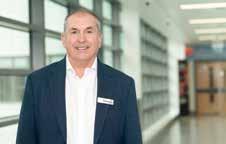
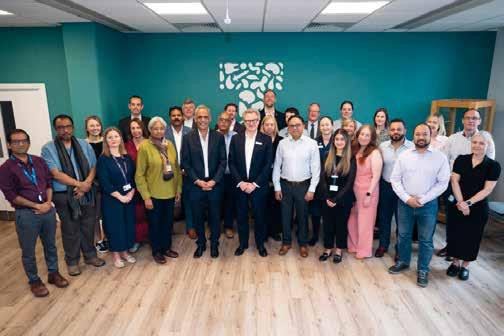
International Centre for Emergency Care & Global health launched in Leeds
A pioneering new programme launched at LTHT aims to revolutionise emergency care – locally, nationally, and globally – through the power of technology, innovation, and international collaboration.
The Centre for Emergency Care and Global Health (CENT-EC Global) was officially launched in June by Prof. Phil Wood, Chief Executive. It will bring together the development of cutting-edge AI tools, virtual learning environments, and international partnerships to tackle some of the biggest challenges facing emergency care today.
Emergency Departments are under immense pressure — from growing patient numbers and rising clinical complexity to severe staffing shortages and premature burnout for staff. These high-risk environments can lead to avoidable harm for both patients and healthcare professionals. Leeds, like many parts of the country, is also seeing stark inequalities in access to
emergency care for socio-economically disadvantaged communities.
CENT-EC Global is a direct and necessary response to these urgent challenges. It brings together Leeds’ strengths in emergency medicine, education, technology, and global health to create a centre of academic excellence focused on practical, scalable solutions. By uniting digital innovation, frontline education, and ethical global partnerships under one umbrella, the centre offers a coordinated approach to making emergency care safer, more sustainable and equitable. It will also serve as a critical platform for strengthening international support networks for the NHS workforce and helping to build long-term global capacity for systems in emergency care in low resource settings.
CENT-EC Global is supported by Leeds Hospitals Charity, industry partners, and academic collaborators, with plans to attract further investment and research funding.
New treatment to reduce cancer pain offered to patients in Leeds for first time
A new treatment which can dramatically reduce pain for cancer patients has been performed in Leeds for the first time.
Leeds is only the fourth centre in the UK to offer this procedure, after London, Glasgow and Liverpool. This means eligible palliative care patients from the Yorkshire region and beyond, who may find it difficult to travel long distances, will now be able to access the treatment.
The procedure, called percutaneous cervical cordotomy, involves heating up the nerves in the spinal cord at the top of the neck, permanently relieving pain on the affected side of the body, while still allowing the patient to walk and move around freely afterwards.
Leslie Thompson, 79, from Yeadon (pictured), was the first patient to receive the treatment at St James’s. He has lung cancer, which has been causing him severe pain.
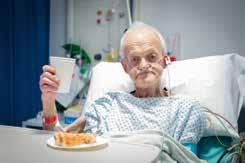
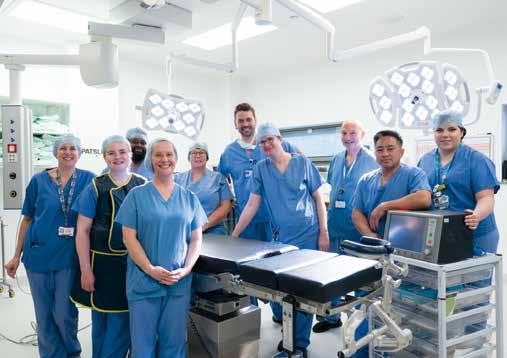
“They look after you really well here,” he said. “I feel less pain in my lung. I think it’s a good idea and it will help a lot of other people. The pain you get with cancer is unbelievable and it affects lots of people.”
Dr Sheila Black, Consultant in Anaesthesia and Pain Management (pictured with the Brachytherapy Theatre team, carried out the procedure after
extensive training at Glasgow and London hospitals.
She said: “I asked Leslie afterwards: ‘How is your pain?’ and he said: ‘What pain?’. That’s really wonderful to hear.”
The procedure is only suitable for patients who have one-sided pain and are well enough to benefit. It should be discussed with consultants and medical teams before it can be considered.
NHS 10 Year Plan provides focus for the coming years
Phil Wood, Chief Executive
At the beginning of July the government announced its 10 Year Plan for the NHS setting out a bold, ambitious and necessary new course for the NHS.
We welcome the plan for recognising the challenges that we face in the NHS. It fundamentally reinvents the NHS’s approach to healthcare so that we can safeguard it for future generations.
The plan has been shaped by the experiences and expectations of members of the public, patients, partners and the health and care workforce across the country. I was proud to see that Leeds Teaching Hospitals has been used as an exemplar in some of the topics including

advanced use of personalised medicine - utilising genomics, AI and data in a national trial for personalised cancer vaccines - and the Leeds Anchor Network initiative with our partners to support people into work.
The plan focuses on ‘three shifts’ - from hospital to community,
from analogue to digital and from treatment to prevention. These three shift areas have significant overlap with work we are already doing in Leeds, such as HomeFirst and our Recovery Care Plan on the Electronic Health Record to help patients receive care at home and return home sooner after hospital admissions.
There is a significant overlap in the plan with our 7 Commitments, including our focus on moments that matter to our patients, which is positive to see and gives us confidence that our approach to patient care continues to be the right one.
You can read the full plan at www.england.nhs.uk/long-term-plan
We’re here to help key workers get moving

Get up to £25,000 toward your deposit
We greatly appreciate the dedication key workers have in their role and in our communities. It’s why we’re launching an exclusive deposit contribution scheme, in which they could get £25,000 towards their new home, just for them.
To find out if you’re eligible and see our range of Arts & Crafts inspired, energy efficient homes, book an appointment today at Centurion Fields in Leeds.
Book an appointment today.
Centurion Fields Or Visit Leeds, LS15 8ST Call: 0113 537 5425 redrow.co.uk

We’re here to help key workers get moving

Get up to £25,000 toward your deposit
We greatly appreciate the dedication key workers have in their role and in our communities. It’s why we’re launching an exclusive deposit contribution scheme, in which they could get £25,000 towards their new home, just for them.
To find out if you’re eligible and see our range of Arts & Crafts inspired, energy efficient homes, book an appointment today at Kingsley Manor in Harrogate.
Book an appointment today.
Kingsley Manor Or Visit Harrogate, HG1 4FZ
Call: 01423 393694
redrow.co.uk

Team Spotlight
ENT/MAXFAX - Ward L23 team
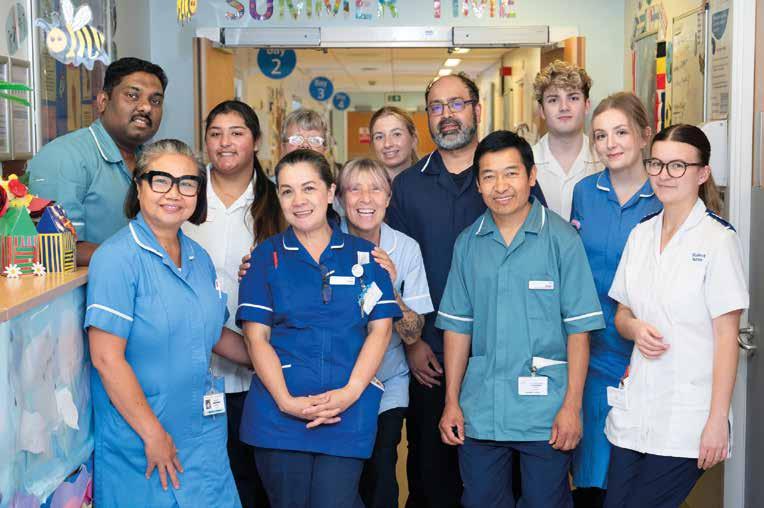
CSU: Head and Neck
Number of colleagues: Around 35
Site(s) worked at: Leeds General infirmary
How does your team make a difference at LTHT?
We’re a specialist surgical ward caring for patients with complex Ear, Nose and Throat (ENT) conditions, as well as those needing Maxillofacial surgery. Our team plays a key role in helping patients recover after major surgery, including tracheostomies, reconstructive surgery, and cancer treatments. We don’t just treat the illness; we care for the whole person. It’s that combination of expert knowledge and kindness that really defines what we do. Whether
someone’s recovering from cancer surgery or learning to speak again after a tracheostomy, we’re there every step of the way.
On average, we care for 22-23 inpatients at any given time and support more than 1,000 admissions every year. What are the different roles within the team?
The ward manager is incredibly proud to lead a diverse and passionate team. The nursing team consists of ward sisters, nurses, nursing associates, clinical support workers and NCSW. The team has an amazing ward clerk, a housekeeper who keeps everything ticking, and a therapy team who regularly work alongside the nursing staff. Our speech and language therapist and dietitian are a vital part of the team too, especially when it comes to supporting patients with communication
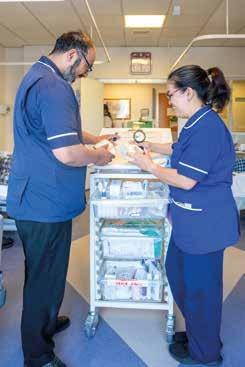
or swallowing difficulties after surgery. Everyone brings something unique to the table.
What happens on an average day?
No two days are ever quite the same. We start with a handover at safety huddle, then dive straight into preparing patients for surgery, supporting those recovering, and managing discharges. We work closely with surgeons and therapists throughout the day, and we’re often teaching or supporting junior staff and students too. It’s fast paced and busy, but we always find time for a bit of a laugh during our breaks.
Between patient care, preparing for surgery, and supporting discharges, our step counts are through the roof. Many of us clock up over 15,000 steps a day.
What is the most surprising thing about the work you do?
Many people are surprised by how much specialist knowledge is required to work in ENT and maxillofacial care. It’s not just about looking after surgical wounds. We care for patients with tracheostomies, feeding tubes, and complex airways, and every patient needs a tailored approach. Also, our patients are with us during a very vulnerable time, especially those being treated for head and neck cancers. The emotional support we provide is just as important as the clinical care. Are there any recent achievements, milestones or plans for the future?
We’re really proud to have recently achieved 540 days without a Grade 2 pressure ulcer. An incredible testament to the team’s vigilance and commitment
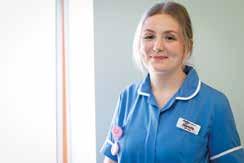
to patient safety. We also recently took part in the Trust’s Nutrition and Hydration Week competition, showcasing the creative ways we support patients to eat and drink well during their stay. We’re also working on improving patient education by developing new noticeboards on palliative care and falls prevention. For the past three years our ward metrics have consistently been in the green. This achievement showcases our ongoing efforts to maintain high standards across all areas, from clinical outcomes to patient experience.
We are also 540 days and counting with no hospital acquired pressure ulcer. What do you enjoy the most about working in the team?
Honestly, it’s the people. We’ve built such a supportive, kind, and hard-working team, and there’s a real sense that we’ve got each other’s backs. No matter how busy or challenging the day gets, there’s always someone there to share a smile or offer a helping hand. There’s also a genuine sense of pride in what we do. We care for patients going through some of the toughest times in their lives, and it feels good to know we’re making a real difference. It’s not just a job it’s a team you’re proud to be part of.
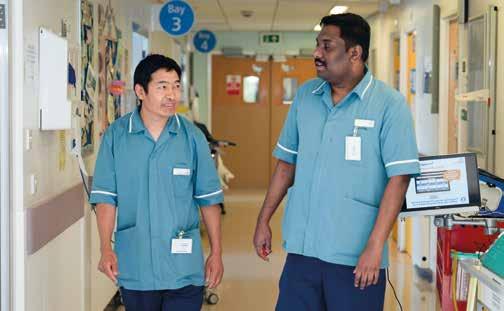
Ms Carin van Doorn honoured with OBE
Ms Carin van Doorn, Consultant Congenital Cardiac Surgeon at Leeds Children’s Hospital, was awarded an Order of the British Empire (OBE) as part of the King’s Birthday Honours in June.

Carin was recognised for her enormous contribution to children’s heart surgery both in the UK and overseas including extensive charity work, over the course of a distinguished career.
Carin has worked at Leeds Children’s Hospital since 2013 where she has led the Congenital Cardiac Surgery team, operating on thousands of children and young people affected by congenital heart disease. Under her leadership the service in Leeds expanded its programme for complex neonatal cardiac surgery and also became one of the largest UK programmes for adult congenital heart surgery. As a senior surgeon, trainer and lecturer Carin is known for supporting her colleagues and members of the wider multidisciplinary team. Carin has also held various national roles in the field of Congenital Cardiac Surgery, championing innovation and improved outcomes for children and young people.
Carin’s OBE also recognised her extensive charity work in the UK and overseas. She is a long-standing trustee of Children’s Heart Surgery Fund who support families affected by congenital heart disease. Carin has also led numerous surgical missions for the Chain of Hope charity, performing cardiac surgery for paediatric patients in less developed countries. As a surgical trainer and educator for the Magdi Yacoub Foundation she helped establish the Aswan Heart Centre in Egypt.
Dr Magnus Harrison, Chief Medical Officer, said: “We are absolutely delighted that Carin has been recognised in the King’s Birthday Honours. Over her distinguished career, Carin has saved countless lives and touched many more. She has made an outstanding contribution to congenital cardiac services here at Leeds Teaching Hospitals and we are incredibly proud of her achievements.”
Estates & Facilities news
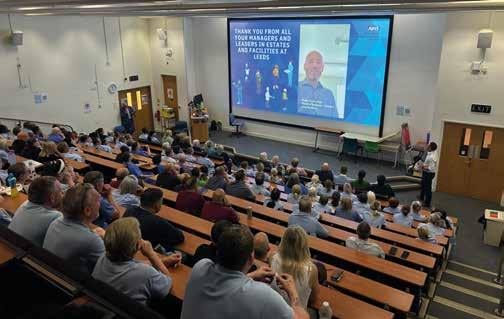
Estates and Facilities Day
On 18 June the Trust celebrated Estates and Facilities (E&F) Day, a national event to say thank you to all our hard-working E&F colleagues across the Trust. Widely recognised as one of the ‘behind the scenes’ areas at the Trust, the importance of their dedication and commitment to patient environment and safety cannot be understated.
Once again, thank you to our Estates and Facilities colleagues for helping to keep our hospitals running and your unwavering dedication to creating a safe and welcoming environment for all those in our care.
Facilities Team of the Year
Congratulations to all our Facilities colleagues who have been chosen as the team of the year at the national Hefma Awards. They beat E&F teams from across the country to be awarded the title, thanks to their innovative, targeted approaches to cleaning and patient safety, their work supporting infection prevention and control, and
the effective application of Leeds Improvement Method principles in their catering practices.
Our Facilities teams work incredibly hard to create an excellent environment for all our patients, staff and visitors, so it’s fantastic to see them recognised at a national level.
Award winning PMVA team
Congratulations to our Prevention and Management of Violence and Aggression team who won the Security Team of the Year Award at the National Fire & Security Matters Awards.
The team have been recognised for the development of the proactive course, which helps to train staff in techniques to prevent and manage violence and aggression in the workplace. Unfortunately, many of our teams deal with challenging situations, but with this course they are trained to have the confidence to safely and effectively deal with these moments. It is also one of the first courses of its kind to be implemented in the UK and has been
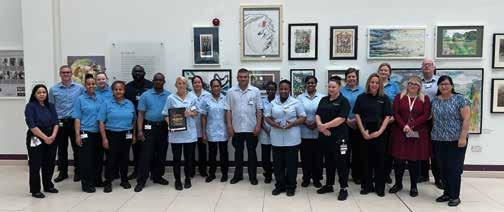
recognised for its proactive approach. Visit the ‘My Learning’ section on ESR and search for PMVA to sign up to a future course.
Wet rooms
Over the last three years E&F and Trust PFI partner Equans have been collaboratively working on water safety at Bexley Wing. This has included upgrades to more than 150 ensuite wet rooms.
Bexley Wing, home to all oncology services for the Trust, includes the chemotherapy day unit, haematology wards, surgical wards and the Teenage Cancer Trust. These wards are classified as augmented care wards, where the infection prevention and control and microbiology requirements are very stringent. Our E&F teams have been involved in multi-disciplinary task and finish groups to ensure the works delivered cause minimal disruption for our patients and continues to offer a safe environment. This has enabled our clinical teams to continue to provide high quality care while the changes have been implemented.
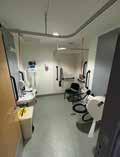

Another three sites allow walking aids recycling
The Sustainability team have been working with the Physiotherapy team to return and recycle walking aids to save the Trust thousands of pounds each year. The scheme has been so successful since the launch of the trial in March that they have worked with Leeds City Council to open a further three sites to allow more Leeds residents to return their walking aids to the Trust, cutting carbon emissions by 98% for each recycled aid compared to buying new.
Our Facilities teams are crucial in this, including the transport team who collect them from the recycling centres and deliver them to the Helideck team who sort and refurbish the walking aids, before they are redistributed back to patients.
with Naz Khan

Head
of Service - Health and Corporate Records, in Informatics, Naz has worked
at the Trust for three years.
What are the main aspects of your role?
I lead team of about 70 staff across five hospital sites and ensure patient records are digitised in a timely manner. A big part of my job is making sure everything runs smoothly, supporting the team and helping them adapt to changes.
What else have you done in your career so far?
I have been fortunate to have worked across different parts of the NHS over the years from national teams at NHS England to local trusts and ICBs. I have managed big projects, helped shape national policies, worked on recruitment campaigns for GPs, Allied Healthcare Professionals (AHPs) and nurses, and led governance work in AHP, safeguarding, primary care, deaths in custody, and redundancies. I have supported
Do
large system wide changes and developed policies and strategies around audits, risk, compliance and antimicrobial resistance, and worked closely with digital and clinical teams. More recently, in my current role I have led on digitising patient records. Outside work, I have been volunteering for over 20 years which has really shaped how I think about leadership and inclusion.
What’s the best thing about your job?
I love being part of a diverse workforce and helping staff grow in their roles. No two days are the same, which keeps things interesting!
What is the one thing you would change at LTHT to help you do your job better?
A more joined-up, collaborative approach to see better access to digital data and reporting tools. This will help us respond quicker to operational pressures, making informed decisions while understanding the impact and benefit. It would also reduce the manual burden on staff to gather information when having the right tools could really help us focus more on making improvements across CSUs.
What’s your best advice to a new starter at the Trust?
It is okay to ask questions, share ideas, and be curious - we are all learning as we go along. And get to know staff!
you know someone who could
help make mealtimes matter?
LTHT is looking for kind, compassionate people to join us as Meal Mates Volunteers – a rewarding role supporting patients during one of the most important parts of their day: mealtimes.
Meal Mates offer friendly, non-clinical help and companionship, making mealtimes more enjoyable and dignified – especially for patients who may not have regular visitors.
Why this matters
Good nutrition and hydration are vital to recovery. They can shorten hospital stays, prevent complications, and boost wellbeing. Mealtimes
are also a time for connection and conversation, which many patients truly appreciate.
What’s involved
Volunteers help patients get ready for meals, offer conversation and encouragement while they eat, ensure food and drinks are within reach, assist with simple tasks like cutting food or pouring drinks, and help with light post-meal routines.
Please note: this is a non-clinical role. Volunteers do not feed patients, give medication, or provide personal care.

Who we’re looking for Friendly, patient, and empathetic individuals aged 18+, able to commit to one two-hour shift per week for at least six months. No hospital experience is needed – just a genuine desire to help.
What volunteers gain
Full training, uniform and ID badge, travel expenses, ongoing support, access to wellbeing resources, and references for future opportunities.
If you know someone who’d be perfect for this role, please encourage them to apply. For further information please email leedsth-tr.volunteering@nhs.net or call 0113 2066510 or 0113 2065888
Mum-of-two cancer free after UK’s second liver transplant for advanced bowel cancer
Vicki Steyert, 37 and a mum-of-two from Wigan in Greater Manchester, was confirmed in June to be the second person in the country to have a liver transplant for advanced bowel cancer. The operation and previous treatment has meant she’s now cancer free. She had her cancer treatment at The Christie NHS Foundation Trust, a specialist cancer centre in Manchester, and her organ transplant at Leeds Teaching Hospitals NHS Trust, one of the largest transplant centres in the country.
Vicki went to the doctor when she was pregnant with her second son, Charlie, in the summer of 2020. Her eldest son, Alex, was just four at the time. She noticed that her bowel habits had changed and that there was blood in her poo. Initial tests didn’t show anything was wrong. She was also experiencing frequent urinary tract infections, which continued after giving birth to Charlie, now three. A scan of her bladder in May 2021 led to some abnormalities in her liver spotted by chance.
“They called me back the same day, and then a CT scan and colonoscopy confirmed that I had advanced bowel cancer that had spread to my liver. Charlie was just six weeks old at the time, so the cancer had been there throughout my pregnancy. It’s a miracle I had no complications and a healthy baby,” Vicki said.
Following her diagnosis, Vicki was referred to The Christie and was told that, because of the spread of the cancer, her treatment would be palliative.
“I was only 33 and a mum to a newborn and a four-year-old, so even though I had suspected that something was wrong, to be given that news was devastating,” she said.
After 60 sessions of chemotherapy treatment and making good progress against the cancer, Vicki became eligible for a liver transplant to remove the cancer that had spread to her liver. Vicki had to be doing well on treatment for two years before she could be considered for the operation, and she hit this milestone in August 2023. She was added to the waiting list the following February and had her surgery at Leeds that summer.
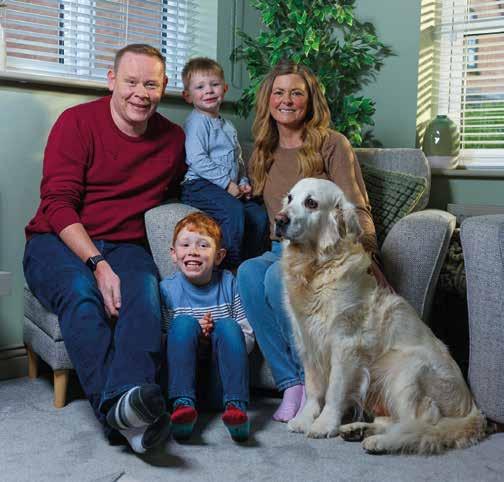
“My team at Leeds didn’t just look after me, they thought about my family as well. They gave me a children’s book so that we could talk to Alex about what was going on. We thought he might be a bit freaked out but loved it and brought it to school to show his friends,” she said.
Unfortunately, the liver transplant didn’t work, so she had to have an emergency transplant a few days later. Despite further complications, her second transplant was successful, and Vicki’s most recent scans show that she’s still cancer-free.
“When people say that cancer is a rollercoaster, they’re not wrong,” said Vicki. “I’ve been through so many highs and lows throughout this whole experience. I’m so grateful to both families who agreed to donate their loved one’s liver – they’ve given me the greatest gift. I can’t thank my teams at The Christie and Leeds enough for giving me a second chance at life.”
Dr Rebecca Jones, Vicki’s hepatologist at LTHT, said: “This program is a new one and still in its early days, but we’re delighted with how Vicki is getting on. Transplantation is successful for most recipients but, when serious complications arise, such as those that Vicki experienced, it can be a long road to recovery. Vicki faced everything with a fortitude, determination and resilience that inspired us all. Everyone who looked after her looks forward to seeing her in the outpatient setting now, hearing of her excursions with her family and watching her return to a more normal life.
“As Vicki’s story clearly shows, organ donation saves lives. It’s important that people sign up to the NHS Organ Donor Register and make their decision known to their loved ones. Families will always be consulted on any decisions around organ donation.”
Farewell to the leafy legend
A giant cheese plant which has grown in the stairwell at the Old Medical School for five decades has been safely rehomed to Tropical World, Roundhay.
Named Audrey, the cheese plant has left the Old Medical School building at LGI, her leafy legacy trailing behind her as she begins a new chapter at Tropical World.
Believed to have taken root in the 1970s, Audrey was discovered in the corner of a stairwell—her origins a mystery. Over the years, she grew from a modest houseplant into a towering green giant, becoming a familiar sight to generations of students, staff, and visitors.
Audrey’s resilience and quiet charm earned her a special place in the hearts of many. She thrived in the filtered light of the stairwell, seemingly content with
her lot, growing steadily and silently as the world changed around her.
On 27 May, Audrey was carefully relocated to Tropical World, where she will enjoy a more suitable climate and expert care. Her departure was met with bittersweet emotions as this is the end of an era for all at the Old Medical School as teams based there move on from the building as part of the transformation of pathology services.
Audrey’s new home promises a lush environment among fellow tropical flora, where visitors can continue to admire her enduring beauty and remarkable story.
As the stairwell echoes a little more quietly now, Audrey’s memory remains rooted in the hearts of all who passed her by.

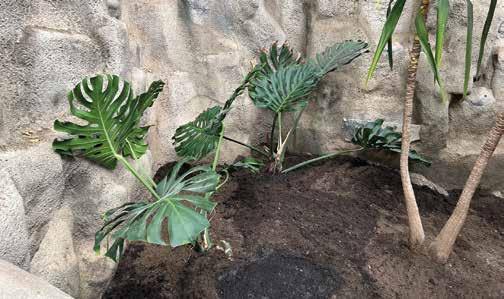
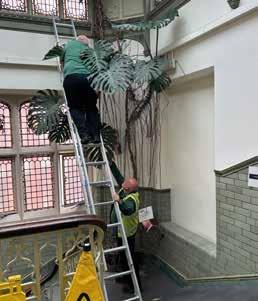
Continuing investment in our digital foundations
This summer we’ve completed another important milestone as part of our wider IT programme to invest in the right foundations, supporting long-term stability, resilience, and scalability.
July saw the completion of our telephone system upgrade programme across all our hospitals - the culmination of several years of hard work, planning and preparation from our Telecommunications team, who are part of DIT.
With over 13,000 phones and 36 million calls a year, our telephone system is a vital part of the way we keep in touch with patients and each other across the Trust. Elements of our
telephone systems were over 30 years old and out of supplier support. This meant parts needed for repairs were in short supply and it was becoming increasingly difficult to secure the right support for faults.
Now, every hospital has a modern system that’s ready for the future – fully supported, running 24/7/365, saving money long-term, and integrated with our data network to support the latest digital tech.

Leeds Hospitals Charity news
New Guiseley charity shop
At the start of July, we opened another brand-new charity shop in Guiseley, and we’re excited to offer all LTHT staff a 20% discount when shopping in store. Simply show your Trust NHS badge at the till. All donations and purchases made in our charity shops help us make a real difference for patients, families and staff at Leeds Teaching Hospitals.
We always need good quality, preloved items for all our charity shops, so please do donate any unwanted items to Leeds Hospitals Charity. You can drop donations off to one of our stores or arrange a home collection.
Visit us at: 32 Otley Road, Guiseley LS20 8AH. We have plans to open new stores in the coming months. Keep an eye out – we may be coming to a high street near you soon!

Funding opportunities for staff
So far this year, we have launched four new funding opportunities for staff, and we’re pleased to have received a range of applications from teams and departments across the hospitals.
There are two remaining funding calls which will open before the end of the year – focused on innovation in healthcare and improving equity in treatment and care.
Sign up to our funding newsletter to receive the latest information about these funding opportunities as soon as they become available: leedshospitalscharity.org.uk/fundingopportunities
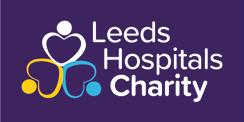
Garden works begin ahead of countdown to MND centre opening
Work is beginning to create wellbeing gardens for patients, families and staff at The Rob Burrow Centre for Motor Neurone Disease (MND), in the countdown to the opening of the new building this autumn.
The landscaped gardens will extend the centre’s therapeutic focus, creating calm, welcoming spaces that offer moments of connection and reflection. They will incorporate mature trees already on site, alongside new planting zones designed for interaction, activity, and quiet contemplation.
The Hands of Hope, handprints of the Burrow family, including Rob’s three children, patients and clinical staff, will be featured in the gardens. There will also be areas for sessions using walking aids and wheelchairs and other monitoring, a first for the MND service in Leeds.
Also featured will be a ‘Tree of Hope’ sapling, grown from the seed of the Sycamore Gap tree, which is being donated by the National Trust.
Leeds-based landscape architects, re-form, have designed the gardens surrounding the new centre, intended as an essential part of the building’s identity and a key feature in shaping how visitors feel as they arrive and spend time at the centre.
Paul Watkins, Director of Fundraising at Leeds Hospitals Charity, said: “The priority of our fundraising appeal was to raise money to build the centre. Since we achieved the target in December 2024, the public have continued to support the Rob Burrow Centre for Motor Neurone Disease. This has enabled us to focus on funding different aspects that will make a difference to people living with MND, including research and this wonderful garden.”
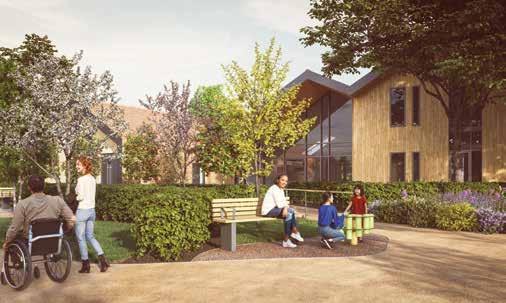
with Anthony Kildare
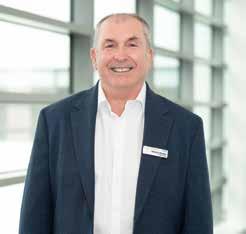
Trust Chair, has worked at the Trust since August 2025
What do you do to wind down and relax after a hard week at work?
We all spend too much time indoors and when I get the
60 seconds 60 seconds
chance, I enjoy being outside, walking the dogs and enjoying the countryside in and around Yorkshire. I try to get a bit of exercise in when I can. Good conversation over family dinners.
What is your ideal holiday destination and why?
Sunshine, decent weather and somewhere to do a bit of exploring whether that’s by the coast, historical sites and monuments, beaches, walks, museums/galleries and experiencing different cultures and food.
What is your favourite food?
I am a keen amateur cook and have toyed with vegetarian dishes... curries of all kinds.
What did you want to be when you were growing up?
A lawyer.
What is your favourite film?
No single favourite film but I grew up with James Bond, Batman and TV programmes like Mission Impossible and enjoy action films sometimes watching these again and again over the years.
Who would you most like to meet and why?
Easy – Sir David Attenborough who has brought the wonders of the natural world to everyone’s TV and computer screen, sharing his passion to care for and protect our planet.
What is your favourite book?
I enjoy Sir Ian Rankin’s detective books which are all set in Edinburgh with John Rebus as the intuitive sleuth.
Tell us something we don’t know about you … I am an identical twin.
Award honours gift of life from Leeds organ donors
Families of organ donors from Leeds were honoured with an Order of St John Award for Organ Donation at a special ceremony in Leeds in June.
This award honours the incredible gift donors and their families in the UK make, by donating organs after death to save or improve the lives of others through transplantation.
Colleagues from the Organ Transplant team also attended the West Yorkshire Awards Ceremony, which was held at the Leeds Civic Hall.

The awards were presented by the Lord Lieutenant, His Majesty’s representative in the county.
Families received a certificate and the award pin featuring a heart motif, made
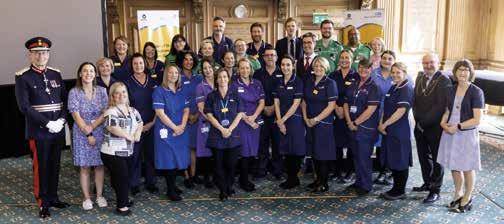
from bi-directional arrows with the phrase ‘Add Life Give Hope’, mounted on the Order of St John’s eightpointed white cross.
The ceremony provided an opportunity for families to reunite with the Specialist Nurse in Organ Donation that supported them at the time, as well as some of the nurses and clinical staff
who cared for them. The families were then able to meet other families with similar experiences.
The award was launched in 2013 in collaboration with NHS Blood and Transplant and similar annual ceremonies are held in South Yorkshire, North Yorkshire and across the UK.

DESIGN PRINT SUPPORT
Planting for wellbeing
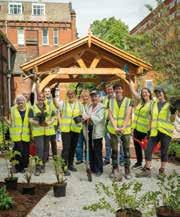




To advertise in this publication please call the sales team on 01302 714528
Rossington Hall, Great North Road, Doncaster, South Yorkshire DN11 0HR 01302 714528 | www.octagon.org.uk | info@octagon.org.uk
The Leeds Teaching Hospitals NHS Trust has not vetted the advertisers in this publication and accepts no liability for work done or goods supplied by any advertiser. Nor does The Leeds Teaching Hospitals NHS Trust endorse any of the products or services.
Every possible care has been taken to ensure that the information given in this publication is accurate. Whilst the publisher would be grateful to learn of any errors, it cannot accept any liability over and above the cost of the advertisement for loss there by caused. Octagon Design & Marketing Ltd has not vetted the advertisers in this publication and accepts no liability for work done or goods supplied by any advertiser. Nor does Octagon Design & Marketing Ltd endorse any of the products or services. No reproduction by any method whatsoever of any part of this publication is permitted without prior written consent of the copyright owners.
Octagon Design & Marketing Ltd.
Rossington Hall, Great North Road, Doncaster DN11 0HR. Tel: 01302 714528
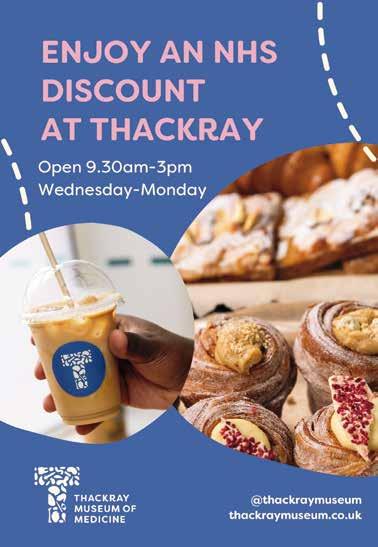
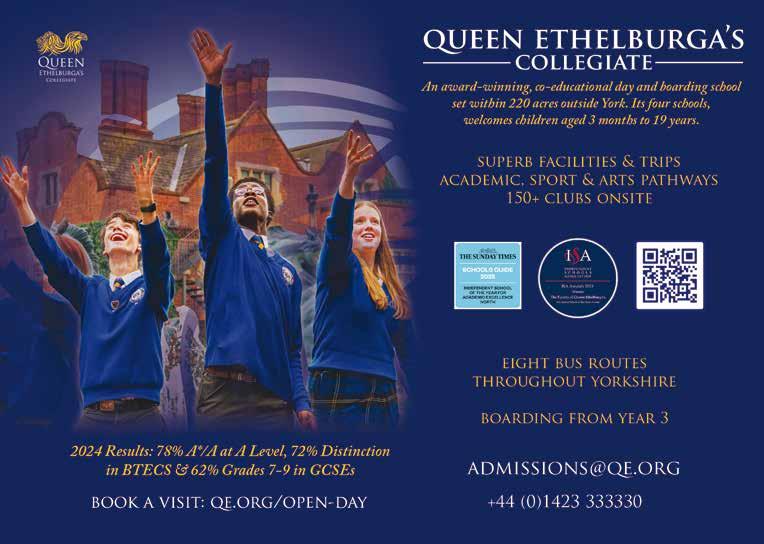

Advertising opportunities available in our staff magazines, care directories, and independent living guides







MATTERS




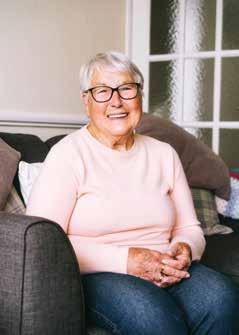

CARE DIRECTORIES
County, City and Borough Council care directories are comprehensive guides to nursing care, residential care and independent living support. Created for individuals and their families exploring the possibility of moving to nursing/ residential care or seeking advice and support to continue living independently at home.







Hospital at Home: supporting patients in their own homes



NHS STAFF MAGAZINES



NHS publications are circulated throughout hospitals to staff, patients and visitors on a regular basis. Advertising within the publications enables companies to promote their services to NHS employees and are an excellent way to Increase their customer base within this very targeted audience.





OPTIONS CARE AND INDEPENDENT LIVING GUIDES
Options provides older people with important information from health organisations such as CQC, ICB and the NHS. Circulated through various healthcare professionals including Council social work teams, NHS hospital discharge, community nurses, and various age related charities.
